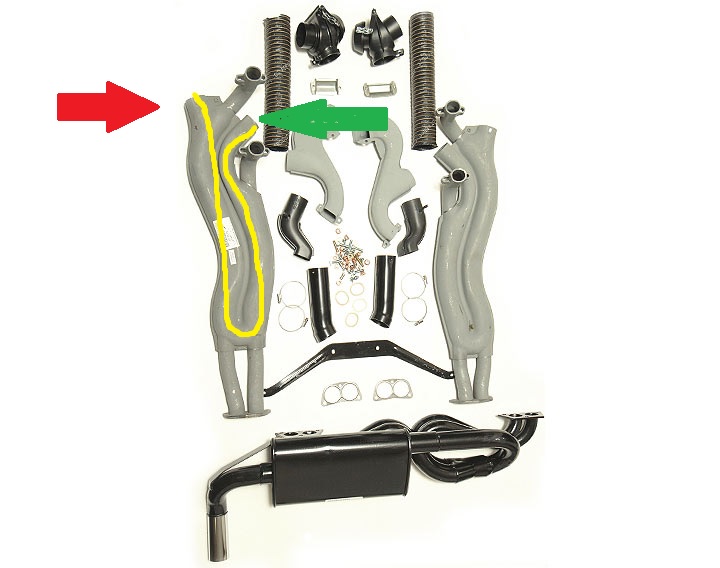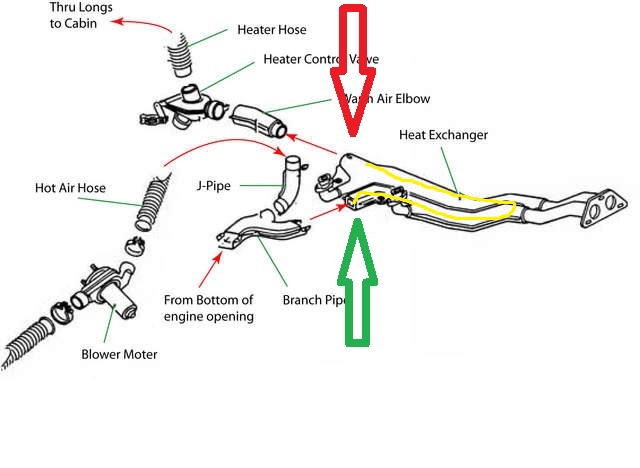Printable Version of Topic
Click here to view this topic in its original format
914World.com _ 914World Garage _ Cleaning the "inside" of heat exchangers
Posted by: Cazz Jan 21 2018, 05:12 PM
Just bought a 73 914. Previous owner has resealed the engine. No noticeable oil leaks. Also the outside of the heat exchangers are very clean.
Problem: The inside of the heat exchangers have oil in them. When the engine gets hot tons of smoke comes bellowing out of the heat exchangers. You can actually hear the oil crackling and burning.
Is there anyway to clean all of this oil out of the "inside" of the heat exchangers without taking them off the car or will this car always smoke with these on the car
Posted by: toolguy Jan 21 2018, 05:31 PM
Take them to a radiator shop and have them hot tank 'ed
Posted by: 914Sixer Jan 21 2018, 06:01 PM
Hot tank is a great idea!
Posted by: saigon71 Jan 21 2018, 08:16 PM
Don't know how to clean them while on the car.
If you pull them, I've had great results with Easy Off oven cleaner and the high pressure wand at the car wash.
Posted by: rjames Jan 22 2018, 01:42 PM
Take them to a radiator shop and have them hot tank 'ed
Probably charge you about $50 and you be certain they're clean inside & out and you won't have to worry about chemical disposal.
Posted by: johnhora Jan 22 2018, 03:59 PM
If you don't want to remove the HEs...then try first by taking the heater hoses off the HEs...then run a garden water hose inside of each HE and run water thru them to rinse the oil out....use some detergent in a spay bottle to help with the oil...since you're in NC and not CA the epa won't have any trouble with your run off....maybe worth a try?
Posted by: mepstein Jan 22 2018, 04:20 PM
If you don't want to remove the HEs...then try first by taking the heater hoses off the HEs...then run a garden water hose inside of each HE and run water thru them to rinse the oil out....use some detergent in a spay bottle to help with the oil...since you're in NC and not CA the epa won't have any trouble with your run off....maybe worth a try?
That's what I would do if the oil in in the air box section.
Posted by: Vacca Rabite Jan 24 2018, 08:55 AM
When you do it MAKE SURE no water end up coming out of the pipe for the exhausts.
Posted by: johnhora Jan 24 2018, 09:56 AM
vacca...not sure what you are asking...
but if you want to do this while the HEs are on the car...
1: remove the heater parts from the HE
2: You now have a BIG U (yellow)
3: take a garden hose and put in the HE at the red arrow
4: turn on the water.....water and oil will come out the HE at the green arrow (can use red or green in reverse)
5: use all safety measures and gear to not get wet or hurt

[attachmentid=636314] 
Posted by: rjames Jan 24 2018, 04:52 PM
Posted by: Vacca Rabite Jan 25 2018, 08:42 AM
vacca...not sure what you are asking...
but if you want to do this while the HEs are on the car...
These things are famous for having the exhaust pipes crack inside the air jackets where you can't see them. So if you flood the air jacket and water comes out the exhaust pipe, that means you have a leak venting raw exhaust into your cabin. No a good thing!
Zach
Posted by: malcolm2 Jan 25 2018, 09:26 PM
The oil was heading to the ground some years ago, but the HE caught it.
Posted by: euro911 Jan 25 2018, 09:54 PM
Pull them so you can verify there are no cracks or holes in the actual exhaust pipes, especially if they're stainless steel HEs.
You can perform this test by pressurize each pipe, or pulling a vacuum through each pipe to verify they're is no leakage ... then spend the money to have them hot tanked as previously mentioned.
Peace of mind is a wonderful thing ![]()
Powered by Invision Power Board (http://www.invisionboard.com)
© Invision Power Services (http://www.invisionpower.com)
